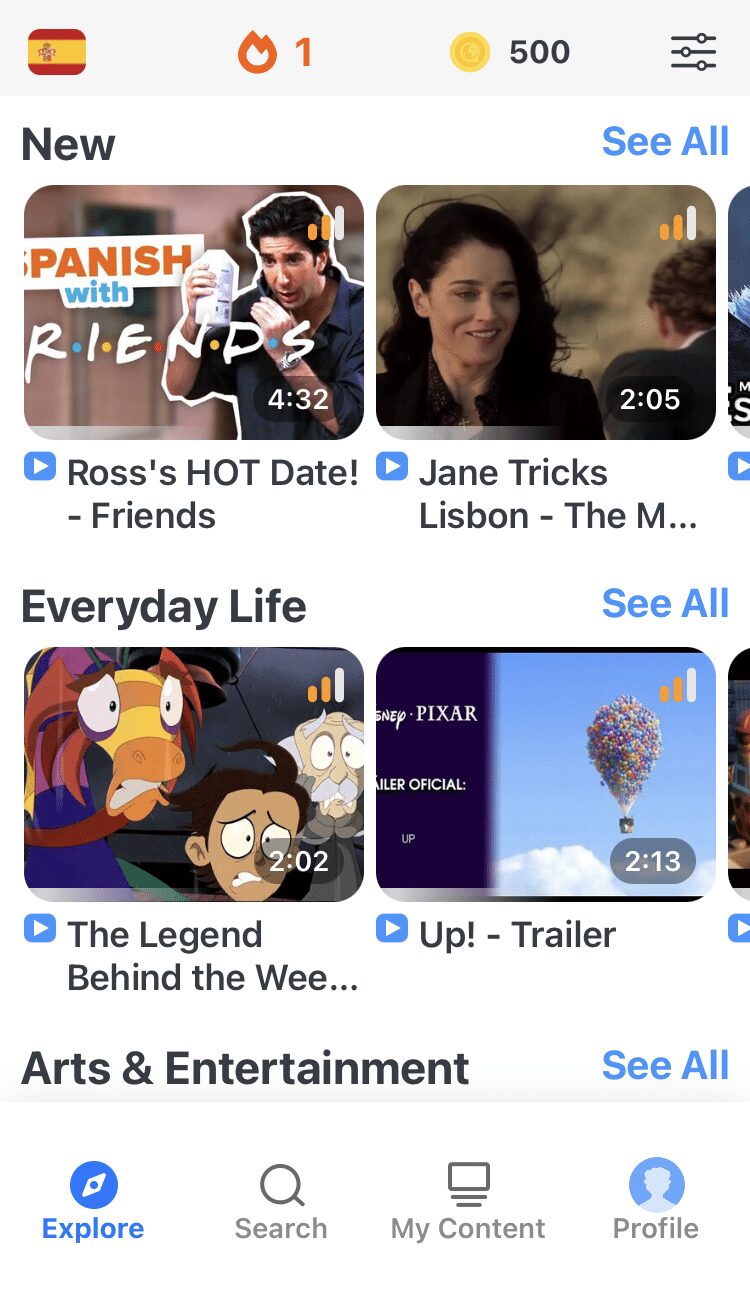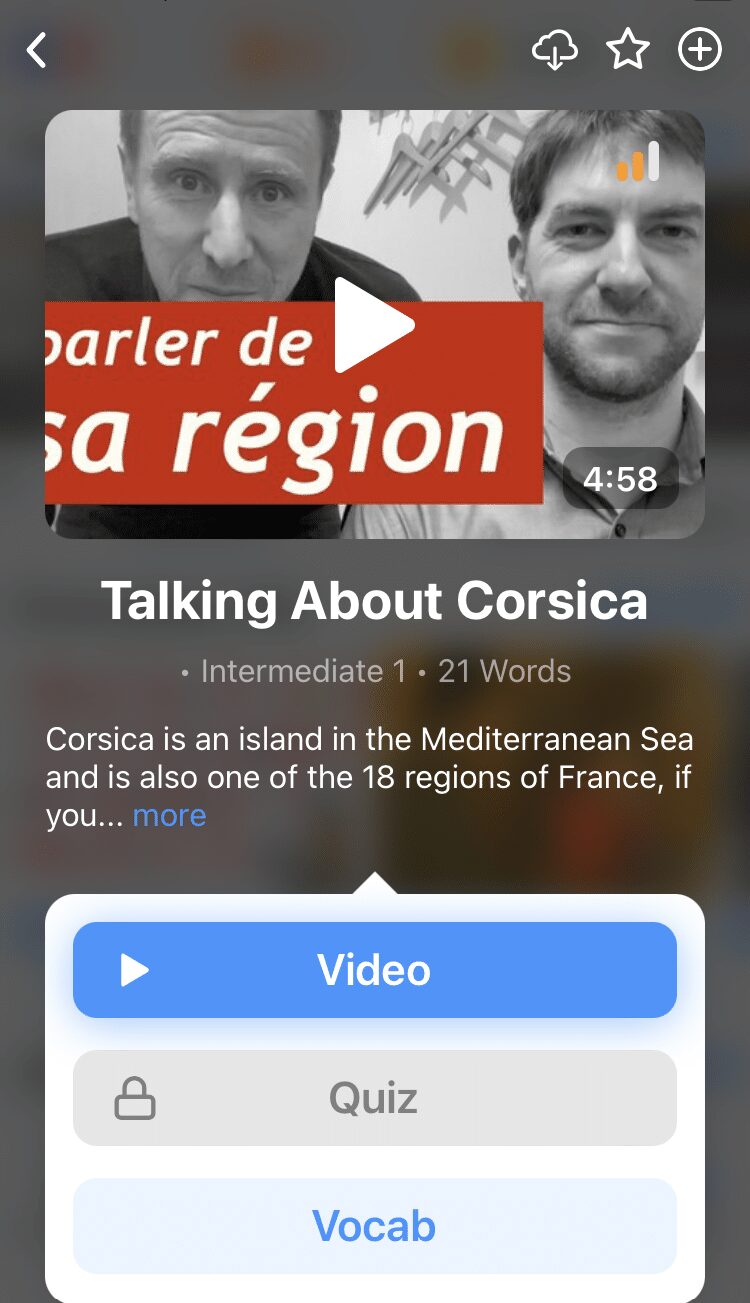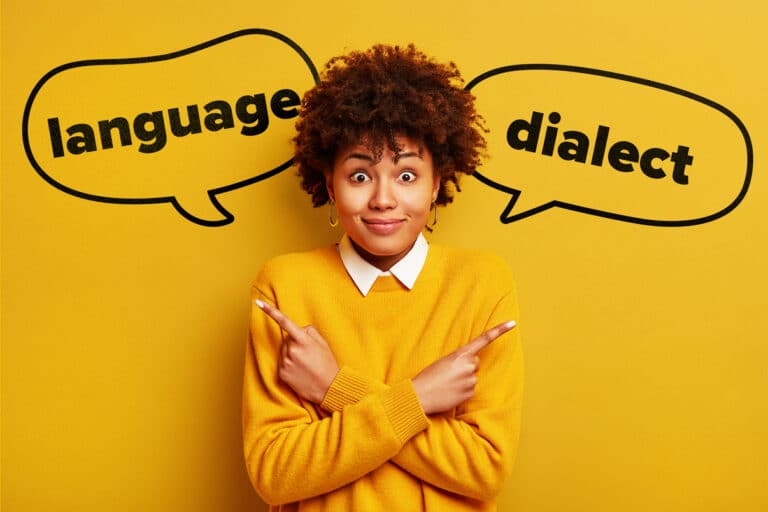Contents
- The Beginning: Pronunciation, First Words and Simple Phrases
- Upper Beginner: Constructing Sentences, Listening to Dialogues
- Low Intermediate: Improving Vocabulary, Listening, Speaking & Writing
- Intermediate: Grammar and Reading
- Upper Intermediate and Beyond: Expressing Yourself and Understanding Others
- How Long Does It Take to Learn a Language?
- And One More Thing...
A Simple Guide to Learning Any Language

For more than a year, I bounced between different French learning resources and techniques. I eventually enrolled in a great French class at school, only to find out I could barely speak the language.
So now, I’d like to give you the advantage I didn’t have and show you a complete map for learning a language that you can adapt to your individual preferences.
Find out in this post what to study at each stage and how to stay consistent in your language-learning journey.
Download: This blog post is available as a convenient and portable PDF that you can take anywhere. Click here to get a copy. (Download)
The Beginning: Pronunciation, First Words and Simple Phrases
Pronunciation
One thing polyglots tend to do differently from the average learner is starting with pronunciation.
Because practice doesn’t make perfect—practice makes permanent.
If you get the wrong patterns in your head, you’ll have a devil of a time getting them out later on.
You’re going to want to do some research on the sounds of the language you’re learning and make sure you know how to make them and distinguish them.
Wikipedia has articles on the sound system—called the phonology—of virtually every language out there, big and small. The articles are a bit technical, but in my opinion it’s some of the best technical knowledge you can pick up when it comes to language learning.
If the Wikipedia articles are beyond you still, then go to YouTube and look for videos about the pronunciation of your target language. Try looking for more targeted, academic videos instead of just quick two- or three-minute overviews.
If you’re learning French, for instance, search for specific features like “French R” or “French vowels.”
Once you’re confident about the individual sounds, move on to words.
Words & Phrases
You’ll need to practice listening and repeating words in isolation and in the context of an example sentence to understand the rhythm of the language.
Rhythm is one of the most important parts of accent, and it really can’t be ignored. Think of a toddler’s speech—they might have trouble with some consonants, but nobody would ever say they have a “foreign accent.” That’s because they’ve already mastered the rhythm. They were hearing it even before birth, every time their mom spoke aloud!
And so most dedicated learners will look high and low for courses with audio or good audiobooks—they want to get as much exposure as possible to the sounds of the language and really soak the rhythm into their heads.
A lot of these course books or guides will tell you to “avoid memorization” as if it’s something that might hurt your learning.
At the true beginner stage, though, you’re going to have to memorize something if you want to start understanding this language.
The advice should really be something like “don’t memorize lists of words without context.” You’ve got to connect what you’re learning to feelings or memories.
So start with a simple game of pretending: Imagine the very first things most people will say to you.
That means greetings, certainly.
Let’s assume you’re using the language for travel. You’ll want to know how to say hello, how to get someone’s attention, how to politely step past people in a crowded space, how to say thank you. If you still don’t know exactly where to begin, these words and phrases are a good bet.
After you pick these things up, you should branch out and learn some verbs, nouns and adjectives from dictionaries, phrasebooks or vocabulary lists.
At this very early stage, it’s a great psychological boost to be able to recognize and understand—so don’t stress out if you can’t produce very much in the language.
Upper Beginner: Constructing Sentences, Listening to Dialogues
Constructing Sentences
Pretty soon, you’re going to want to move beyond the phrases you’ve learned and begin to express yourself.
For that, you’re going to need to know how to construct sentences.
In many languages, you can start picking up these rules intuitively just by looking at a handful of examples.
If your phrasebook tells you that “What is your name” and “What is his name” are identical except for the pronoun, there’s a good chance that “What is her name” follows a similar pattern. Keeping your eyes open for these patterns is going to boost your learning significantly.
But when it’s not clear from context what the next word should be, you’re going to have to move beyond the phrasebook and begin with a grammar resource.
The very concept makes a lot of people cringe. But these days, you can sample many simple, free online courses with an emphasis on sentences.
Your local library may also have well-known coursebooks in its collection. Try books in the “Teach Yourself” or “Dummies” series for a solid intro to the grammar.
Listening to Dialogues
At the same time, you’re going to want to begin your long listening journey around this point. Listening is incredibly important for learning languages at really any level, for all kinds of reasons—from getting used to different accents to improving your reaction time with new vocabulary.
Search through YouTube to find beginner lessons or dialogues in your target language, or look for a textbook with companion audio that you can get at a low cost (or from a library!).
Listen to these dialogues again and again over a period of a few days.
You want to be giving your mind two simultaneous tracks to learning the language: naturally, through examples and dialogues, and systematically, through overt explanations of grammar rules.
One way you can listen to natural-sounding dialogues with material made by and for native speakers is with the online program FluentU.
FluentU takes authentic videos—like music videos, movie trailers, news and inspiring talks—and turns them into personalized language learning lessons.
You can try FluentU for free for 2 weeks. Check out the website or download the iOS app or Android app.
P.S. Click here to take advantage of our current sale! (Expires at the end of this month.)
Low Intermediate: Improving Vocabulary, Listening, Speaking & Writing
As you progress through the stages, you’re naturally going to become a better and better self-learner.
Because of that, you probably don’t need this guide to tell you, “Repeat after your dialogues. Keep an eye on your pronunciation.” Of course, you’re going to continue doing the things that make you progress onward.
So take these next several steps as additional suggestions rather than all-encompassing instructions. Stay well-rounded in your learning, and even go back and review older material for as long as you want.
Improving Vocabulary
Now that you’ve got some of the basics down, the whole wide world of vocabulary out there is yours to conquer. The only question is, where to start?
- Again, one of the best ways to learn vocabulary is to really connect with what you’re trying to memorize. If you watch an interesting video or read an interesting article in your native language, look up some of the main vocabulary points and you’ll remember much better than if you learned those same words from a list.
- Continue to follow the guidance of whatever grammar resource you’re using—ideally, your resource should challenge you enough as you move on that you don’t grow bored and try to jump ahead too fast. If you bite off more than you can chew, you’ll likely lose motivation.
Listening
At this point, you should be looking for as many listening resources as you can.
It’s difficult at this point to pick up new words from listening alone—so don’t shirk the vocabulary—but unless you plan to mostly read and write your target language, listening is the core skill.
11 Strategies to Improve Your Listening Skills in a Foreign Language | FluentU Language Learning
Struggling with language listening? Want to know how to improve listening comprehension in a foreign language? Here are 11 strategies to step up your listening skills.…
And it takes a lot of time to develop.
That means enjoyment is the key to progress. Don’t waste your time watching things you don’t like. If you’re into photography, watch camera reviews. If you like makeup, there are makeup tutorials in hundreds of languages on YouTube.
One of the most valuable resources at this point in your learning is audio with transcripts, such as videos with subtitles.
The YouTube project Easy Languages is an outstanding collection of street interviews with subtitles in both the target language and English.
Watching short, entertaining videos is a great way to keep yourself focused and on task during this important study activity.
Speaking & Writing
It’s tough to speak when you don’t have much you can say.
That’s why we haven’t mentioned speaking too much until now.
Some language acquisition experts believe that you learn most effectively if you’re not pushed to speak or write until you can understand a lot of what you read and hear.
And that makes sense—it’s demoralizing to enter a conversation and constantly be lost as to what your partner is saying.
At this stage in your learning, however, you should be itching for some speaking practice. The single best free place for speaking practice online is a language exchange site called Conversation Exchange. It’s got a huge community of people from all over the world, waiting to help you with their native languages.
Writing is daunting, especially in languages with lots of grammatical forms to memorize. But writing practice always has a positive effect, even if nobody corrects your mistakes. Just the act of writing on its own helps you recall words better. As you continue reading, you’ll develop more and more of an intuition for the grammar as well, and before long you’ll even be able to correct your own mistakes.
Scheduling your output practice is something you’ll have to do on your own depending on how comfortable you are with it and how important it is for your purposes. If you enjoy it, try to work in some speaking and writing at least twice a week so you don’t get too rusty.
Intermediate: Grammar and Reading
Grammar
At this point, you’re going to need to shore up any remaining leaks in your grammar knowledge.
Your general online courses and book guides may not cut it here. Luckily, for commonly studied languages like French, Russian, Japanese and German, the internet is awash with free and in-depth grammar guides.
Here’s where I actually won’t recommend YouTube, though there are of course some gems to be found, as the best resources tend to be single-purpose grammar overviews like Dartmouth’s German grammar page or JGram for Japanese.
Beyond that, the publisher Routledge has a whole line of “Modern Grammars” for ten major languages. They’re some of the best reference grammars and workbooks around, and can really help you figure out what you’ve been missing. If your language isn’t on that list, try their “Essential Grammar” line or look around for a reference grammar at a library or online bookstore.
Grammar is so important at this stage because you’re likely to start internalizing mistakes soon. If you don’t nip these in the bud, your grammar mistakes will become bad habits later on that are harder to break.
Reading
Now you can slowly but surely work your way through simple native texts.
I really like the NHK World news site for its no-frills daily news reporting (in 18 languages). The articles are written for natives, not learners, but they’re short and digestible enough to be very helpful reading practice.
Every major city around the world has newspapers or other media outlets in their own language as well. For just one of scores of examples, check out “Público,” a popular news source from Portugal.
Now, it’s likely that the feature articles and opinion pieces on these websites will still be too hard for you at this point.
But that’s just fine—most have all kinds of lighter content like recipes, entertainment news, sports scores and lifestyle tips. Usually with video included, too!
Check out the topics that most interest you. It’s fine if you end up only looking at pictures and their captions. The most important part is that you’re immersed in the language wherever you go on that site.
Offline, you should look for translated books from your native language. If there’s a best-seller you’ve read cover to cover tons of times, that’s a perfect tool for diving into literature.
Translated books are easier to start out with because the plot and characters are likely going to be more familiar to you, culturally speaking. With a more accessible story-line, you can focus on absorbing the language through your extensive reading.
https://www.fluentu.com/blog/intensive-and-extensive-reading/
Upper Intermediate and Beyond: Expressing Yourself and Understanding Others
Expressing Yourself
The more you read, the more you listen, the more you expose yourself to, the more you’re going to learn.
Understanding complicated, authentic native speech is not an easy task. And at the high-intermediate stage, it really can seem like you’ve plateaued because the gains are harder to see.
Going from a vocabulary of 100 to 500 words feels amazing, but from 4000 to 4400, the effect barely registers, since you can already understand most of what you encounter.
The key is to keep going and to branch out. Challenge yourself with material you might not normally think of, such as cooking shows or comedy routines. When you come back to the material you saw earlier, it won’t seem nearly as hard.
Understanding Others
Repeating after dialogues, writing on your own and reading aloud are all excellent learning strategies, but if your goal is fluent communication, there’s no better way to get there than communicating.
Whether it’s with a tutor, a friend or even strangers on the street, you should take whatever opportunities you can to have conversations.
Ask your speaking partners to strike a balance between correcting your mistakes and allowing you to speak freely. Schedule some sessions as “tutor” sessions and some as “conversations.”
You need a mix of these two practice styles to get into the flow of a natural interaction while also continuing to work on your mistakes.
How Long Does It Take to Learn a Language?
But how long do you need to keep at those studies? That’s a question that’s been asked many, many times over.
It depends on a few main factors:
- The frequency of your study sessions.
- The familiarity of the language.
- The interest you have in the language.
How Long Does It Take to Learn a Language? It Depends | FluentU Language Learning
How long does it take to learn a language? Well it depends, but you can probably breeze through the beginner levels in about three months and hit a comfortable…
If you only study once a week, you’ll barely get anywhere. You need to give your brain a chance to absorb the material by frequently thinking in or about the language. More frequent and more consistent study means faster learning.
A language that’s closely related to others you might know, or that shares a lot of vocabulary, will fit easier in your mind because you can guess how to apply your previous knowledge.
Finally, if you’re fascinated by it and the people who speak it, any language can become child’s play, because you’re intrinsically motivated to understand and communicate using it.
You may not have as much control over the last two factors, but you do have some control over the first. Additionally, if you’re disorganized in your learning, you’re likely to retread old ground or run up against walls. You’ve got to have something to help you along and show you what you should be focusing on—like a language-learning guide.
A dedicated, motivated self-learner following a good guide should be able to achieve a comfortable intermediate level in about 300-500 study hours, spread over roughly 10-14 months.
That means averaging around an hour, or at least 40 minutes, of learning time every day. It’s hard for most people to set aside that kind of time, but cut it into two or three chunks of 20 minutes and suddenly it seems far more doable. You might even spend 20 minutes reading posts or articles like this one today.
An audio course in the car, a book on the bus, a video before bed—that’s how you fit those study hours into a busy day.
You want to get in the habit of never really letting the language out of your sight.
After that… it’s up to you.
The intermediate-advanced stage of language learning sometimes seems like it’ll never end.
Even if you’re continuing to study, it might not seem like you’re making progress until you really challenge yourself.
But then all of a sudden, you look back at an old piece of writing you did or a book that was giving you trouble—and you see how far you’ve come.
Consistency is the single most important part of any personal improvement.
When you put in the time and effort on a regular basis, you simply can’t fail to see results.
Download: This blog post is available as a convenient and portable PDF that you can take anywhere. Click here to get a copy. (Download)
And One More Thing...
If you dig the idea of learning on your own time from the comfort of your smart device with real-life authentic language content, you'll love using FluentU.
With FluentU, you'll learn real languages—as they're spoken by native speakers. FluentU has a wide variety of videos as you can see here:
With FluentU's Chrome extension, you can bring interactive learning tools directly to YouTube or Netflix, and even import your favorite YouTube videos directly into your FluentU account.
FluentU has interactive captions that let you tap on any word to see an image, definition, audio and useful examples. Now native language content is within reach with interactive transcripts.
Didn't catch something? Go back and listen again. Missed a word? Hover your mouse over the subtitles to instantly view definitions.
You can learn all the vocabulary in any video with FluentU's "learn mode." Swipe left or right to see more examples for the word you’re learning.
And FluentU always keeps track of vocabulary that you’re learning. It gives you extra practice with difficult words—and reminds you when it’s time to review what you’ve learned. You get a truly personalized experience.
Start using the FluentU website on your computer or tablet or, better yet, download the FluentU app from the iTunes or Google Play store. Click here to take advantage of our current sale! (Expires at the end of this month.)











